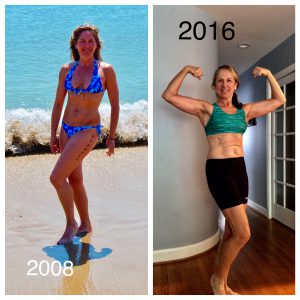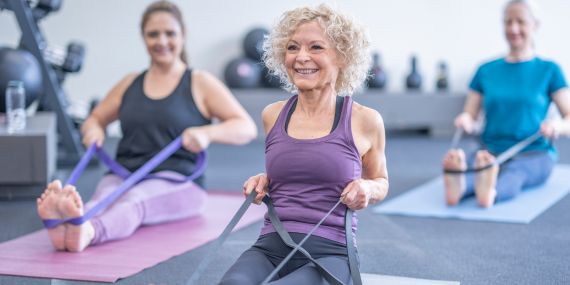Do all women gain weight in menopause? The simple answer is no, but there are several factors to consider why many women do.
Your workout and nutrition plan has kept you lean and in shape for years. But, suddenly, those strategies and routines aren’t working anymore, and you start to gain weight (especially around the midsection). Find out how to stop weight gain through menopause based on science.
The Importance of Hormones In Menopause
Estrogen and progesterone have a significant impact on energy levels, mood, and general well-being:
- Estrogen: This hormone helps to regulate the metabolism and body weight. Lower estrogen levels can lead to weight gain, slower metabolic function, and decreased energy. Additionally, estrogen helps to stabilize mood and promotes good sleep, both of which can be affected during menopause leading to feelings of fatigue and reduced energy.
- Progesterone: Progesterone also plays a role in sleep regulation, with lower levels potentially contributing to insomnia or disrupted sleep patterns. As a result, women going through menopause may feel tired or lack energy due to poor sleep quality.
It’s also important to note that menopause can cause other symptoms, such as hot flashes, night sweats, and mood swings, disrupting sleep and decreasing energy levels.
There is a solution to weight gain in menopause!
7 years ago, my thyroid was removed, and the shock to my endocrine system (a group of hormone-producing glands that regulate metabolism, growth and development, tissue function, sexual function, reproduction, sleep, and mood, among other things) caused the start of menopause.
It took 2 years to find the right medication dosage for my body to function normally and prevent my body from gaining more weight. The roller coaster of weight loss and gain had taken its toll on my body in the form of 10 extra pounds. I had maintained a healthy diet full of fruits and vegetables, training for marathons, but I still couldn’t lose the weight. So then, I changed my strategy and started taking my diet and workouts more seriously.

Weight gain is one of the most undesirable and frustrating side effects of menopause. The ovaries produce progesterone and estrogen, but those hormone levels drop during menopause. Your body is now more sensitive to carbohydrates and fluctuating blood sugar levels. The body uses protein less effectively than before, and building and maintaining muscle is harder.
Your body composition starts to change, and many women gain weight around the midsection. The recommended 150 minutes of exercise per week is no longer enough to maintain weight.
How To Stop Weight Gain Through Menopause
Exercise Tips That Stop Weight Gain In Menopause
Weight gain during menopause is expected due to changes in hormones, age, lifestyle, and genetics. However, regular exercise can help prevent this weight gain and provide other health benefits as well. Here are some exercise tips to help manage weight during menopause:
- Aerobic Exercise: Regular cardiovascular exercises such as walking, cycling, swimming, or jogging can help burn calories and reduce fat. Aim for at least 150 minutes of moderate aerobic activity or 75 minutes of vigorous activity each week.
- Strength Training: As you age, you naturally lose muscle mass which can slow your metabolism and lead to weight gain. Strength training exercises like lifting weights or resistance bands can help build muscle mass, boost metabolism, and burn more calories.
- Yoga and Pilates: These exercises can help improve flexibility, balance, and strength. They also incorporate mindful breathing and can help reduce stress, which can contribute to weight gain.
- High-Intensity Interval Training (HIIT): This form of exercise involves short bursts of intense exercise alternated with low-intensity recovery periods. HIIT can help burn more calories in less time compared to moderate-intensity exercises.
- Stay Consistent: Consistency is key when it comes to exercise. Try to make physical activity a regular part of your daily routine.
- Find Activities You Enjoy: You’re more likely to stick with an exercise routine if you enjoy the activities. This could be dancing, gardening, hiking, or even playing with your grandkids.

Nutrition Strategies To Stop Weight Gain Through Menopause
Losing weight effectively often involves making careful choices about your diet. Incorporating nutrient-dense, low-calorie foods can help you feel full while still creating the calorie deficit necessary for weight loss. Here are some food groups to consider:
- Whole Grains: Foods like brown rice, oatmeal, quinoa, and whole wheat bread are rich in fiber, which can help keep you full and satisfied.
- Lean Proteins: Lean proteins such as chicken, turkey, fish, eggs, tofu, and low-fat dairy can help you feel full for longer. They’re also crucial for maintaining and building muscle mass.
- Fruits and Vegetables: These are high in fiber, low in calories, and packed with vitamins and minerals. They’re also usually high in water, which can help keep you hydrated and feeling full.
- Healthy Fats: Foods like avocados, nuts, seeds, and olive oil are high in monounsaturated and polyunsaturated fats. These can help satisfy your hunger and provide essential nutrients, though they should still be consumed in moderation due to their high-calorie content.
- Beans and Legumes: Foods like black beans, lentils, chickpeas, and other legumes are high in protein and fiber, which can help keep you full and provide a steady release of energy.
- Whole, Unprocessed Foods: In general, foods that are less processed have fewer added sugars, unhealthy fats, and empty calories. They tend to be more nutrient-dense and filling than highly processed foods.
Remember, it’s important to consider portion sizes even when consuming healthier foods since calories can still add up. Also, avoid eating processed carbohydrates (white bread, potato chips, crackers). This helps you to reduce belly bloat as well.
Start with 1 small change to see a lasting result. Then, don’t feel frustrated about the slow but steady progress.
How To Stay Consistent
Staying consistent with an exercise program can be challenging, but it is essential for maintaining health and wellness, especially for women over 50. Here are some tips:
- Find an Activity You Enjoy: Exercise doesn’t have to be a chore. It could be dancing, swimming, yoga, Pilates, walking, or cycling. The more you enjoy the activity, the more likely you are to stick with it.
- Set Realistic Goals: It’s essential to start slowly and gradually increase your workouts’ intensity and duration. Setting achievable goals can help you stay motivated and avoid injury.
- Schedule Your Workouts: Like any other important appointment, schedule your workouts in your calendar. Having a hard time with exercise can help ensure you don’t skip it.
- Stay Social: Exercising with friends can make it more enjoyable and help you stay accountable. Consider joining a fitness class, hiring a personal trainer, or walking with a friend.
- Listen to Your Body: Rest is as important as exercise, especially as you age. Be sure to take rest days and listen to your body to avoid overtraining and injuries.
- Incorporate Variety: Doing the same workout routine over and over can get boring and lead to a plateau. Instead, try up your workouts to keep them interesting and challenge different muscle groups.
- Consult a Professional: A fitness trainer or physical therapist can help design a workout program that suits your needs and abilities. They can also guide proper form and technique to prevent injury.
Remember, it’s never too late to start exercising and reaping the benefits. The key is to find an exercise routine that suits your lifestyle and preferences and to stay consistent with it.
